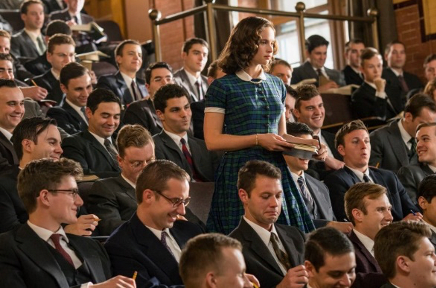Legal Lessons from Hollywood: On the Basis of Sex
- annamarks8
- Oct 19, 2020
- 4 min read
Updated: Dec 1, 2020
Rest in Peace
I am writing this article out of deep respect, with humility, and with great sadness. A month ago, on September 18th 2020, tragedy struck when Justice Ruth Bader Ginsburg died from complications of metastatic pancreatic cancer. In other words, death has robbed us of an extraordinary woman who was a gender rights hero and a feminist icon. This article was written not to remind ourselves of her death, but with the intention to remember her life and celebrate her accomplishments.
Plot
The story of Justice Ruth Bader Ginsburg's breakthrough as a civil rights attorney who fought for equal treatment before the law in relation to gender has been told in the biopic 'On the Basis of Sex'. The film stars Felicity Jones, as Ruth Bader Ginsburg (RBG), and Armie Hammer, as her husband Martin Ginsburg. The film can be divided into three parts, looking at her struggle against sexism in the legal profession and the apparent gender stereotypes. In addition to telling her success story, the film focuses in great detail on legal manoeuvring and case preparation.
Part I – Law Student in 1956
After you have made yourself comfortable in your ‘home cinema’ – you have leaned back, prepared some popcorn and pressed play – one of the first things you hear is the song “Ten Thousand Man of Harvard”, hinting at this part’s theme, while RBG climbs the stairs of Harvard Law School surrounded by men. It is the year 1956, and it is only the sixth year that women have had the privilege to obtain a Harvard Law degree. In her class of approximately 500 students, RBG is one of only nine female law students. Such statistics are unthinkable in our modern society, for instance in 2017 the university reported that 48,9% of its students identify as female. As a result of the imbalance between the genders and the stereotype of traditional gender roles, RBG is often not taken seriously by her professors nor her peers. Nevertheless, with grace, a bit of sarcasm and her husband’s support, she manages to hold her ground. In addition to attending her own classes, RBG is seen taking notes on behalf of her husband who was undergoing cancer treatment at the time and couldn’t go to classes himself. Their supportive and egalitarian marriage is emphasised throughout the film.
Part II – Late 1950s and Early 1960s
After two years at Harvard and finishing university at Columbia Law School, RBG graduated top of her class and was on the Law Review of both universities. However, her outstanding academics don’t change the fact that she is “a woman, a mother and a Jew” in the words of a recruiter during a job interview. Thus, rendering her triple unemployable as an attorney compared to her husband who was a successful tax attorney. Longing for the chance to represent clients before the court in pursuit of justice, she soon realises that she will have to put her dream on hold. Instead, she accepts an offer to become a professor of the law faculty at Rutgers. In the film, we see her teaching a class titled “Sex Discrimination & the Law” which leads to a smooth transition to the third part.
Part III – Breakthrough in 1970s
Almost haughtily, RBG says that she doesn’t read tax court cases when her husband hands her the tax court reports. Little did she know that her husband was steering her in the direction of a game-changer. The case of Moritz v Commissioner would be RBG’s personal breakthrough as the leading gender rights lawyer of her generation, and a ground-breaking, landmark case. The Internal Revenue Service had denied a petitioner a tax deduction to hire a nurse to take care of his senile mother because of his gender. At the time, Section 214 of the Internal Revenue Code assumed that a caregiver had to be a woman and further provided that all women regardless of their marital status were entitled to a caregiver tax deduction. A man, on the other hand, could only be granted such deduction if widowed or divorced. In the case at hand, the petitioner had never been married and was therefore not entitled to the caregiver tax deduction. RBG successfully argued in the Court of Appeals for the Tenth Circuit that this discrimination against a man on the basis of his sex was unconstitutional under the 14th Amendment to the United States Constitution. One of her arguments was that the precedent should no longer apply as society had changed and that the law should reflect those changes. “A court ought not be affected by the weather of the day, but will be by the climate of an era.” The court unanimously reversed the Tax Court’s decision in Moritz v Commissioner which, alongside Reed v Reed, was the first federal case to declare gender discrimination as unconstitutional. However, there were still more than 170 laws that differentiated on the basis of sex that were tackled by RBG and other gender equality advocates such as her idol Dorothy Kenyon[x].
Final Thoughts
The film ends shortly after the triumph in court with a cameo appearance of the real “Notorious RBG” walking up the steps of the court. After her breakthrough, she would win several landmark cases before the Supreme Court. Eventually, in 1993, the senate confirmed her nomination with a vote of 96 to 3 making her the second woman appointed to the Supreme Court. Her pointed and powerful dissenting opinions earned her the status of a feminist rock star. Her legacy will be remembered for centuries to come. Thank you, Ruth!














Comments